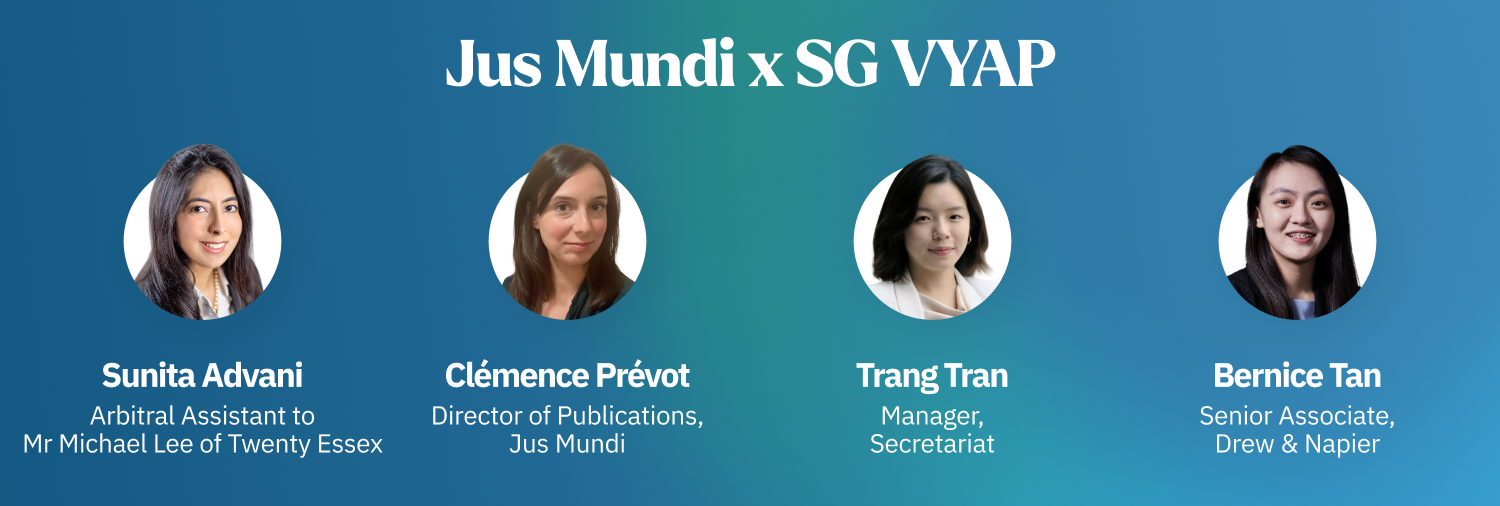Young ICCA and SG VYAP Event Recap
THE AUTHOR:
Rachel Hage, Dual J.D. & Master II Candidate at American University Washington College of Law & Université Paris Nanterre
On January 23, 2025, Young ICCA and SG VYAP hosted a hybrid event for experienced professionals to share their insights on how junior lawyers can improve their respective international arbitration practices. The in-person portion of the event took place at Herbert Smith Freehills Prolegis’ offices in Singapore, where the panel featured Michael Lee (Arbitrator, Twenty Essex, London and Singapore), Timothy Cooke (Managing Partner, Reed Smith, Singapore), Lim Tse Wei (Senior Associate, Herbert Smith Freehills Prolegis, Singapore), and Gianni Pizzitola (Associate, Debevoise & Plimpton, New York; Young ICCA Regional Representative) who spoke virtually. Sunita Advani (Arbitral Assistant to Mr Michael Lee of Twenty Essex, Singapore), SG VYAP’s Founder and Chair, and Trang Tran (Manager, Secretariat, Singapore), SG VYAP’s Events Director, moderated the discussion.
Oral Advocacy: Building Confidence and Effective Advocacy Skills
The event began with a discussion on oral advocacy, particularly for junior lawyers who are unaware of the differences between oral advocacy in litigation and oral advocacy in arbitration. Michael Lee emphasized that approaches to oral advocacy often depend on whether you have a background in common law or civil law, but regardless of the approach, one should find a way to relax because self-confidence in oral advocacy is key. Lim Tse Wei advised junior lawyers to consider their arbitrators’ training and legal backgrounds. He noted that there are often differences in procedural expectations across jurisdictions. Gianni Pizzitola explained that it can take a while to find your voice, but by observing mentors and other colleagues, you can adapt to find a style that fits your strengths and is the most persuasive coming from you.
Adding Value During the Document Production Phase
Next, the panel explored how junior lawyers can add value during the document production phase of an arbitration. Michael Lee underscored the necessity of thorough case knowledge and meticulous preparation because, from an arbitrator’s point of view, there is nothing worse than an overly broad request for production of documents. Gianni Pizzitola suggested that junior lawyers always approach a task as if they were the sole lawyer on the case. He explained that this forces you to think three steps ahead, which fosters proactive thinking for the attorneys above you and what they need.
Witnesses Preparation and Evidence Management: Key Tips for Junior Lawyers
Concerning witness preparation, Michael Lee stressed the importance of adhering to jurisdictional rules and allowing witnesses to express their stories authentically. He said that he often receives witness statements that clearly do not reflect the witnesses’ own words, which is usually revealed when they are put on the stand. Timothy Cooke further warned against prematurely drafting witness statements and advised conducting a more open-ended interview with witnesses to elicit comprehensive testimonies. Moreover, Lim Tse Wei recommended a balanced approach that respects witnesses’ time and organizational sensitivities and should not be probed unnecessarily. Lastly, Gianni Pizzitola emphasized that in addition to all his peers’ advice, building rapport with witnesses, even off-camera, can enhance the quality of witness statements because it helps you understand how the witnesses think.
Gaining Expertise in Interim Applications: Practical Advices for Junior Lawyers
Timothy Cooke and Lim Tse Wei encouraged junior lawyers to seek hands-on experience in interim applications, and emphasized that understanding institutional rules and gaining exposure through participating in various applications is invaluable. The panelists explained that a junior lawyer can only succeed by putting their knowledge into practice. They therefore encouraged junior lawyers to actively seek opportunities to participate in interim applications regardless of whether such experience is applicable to their work.
Common Pitfalls for Junior Lawyers and How to Overcome Them
Next, the panelists discussed common pitfalls of legal practice that they often observe among junior lawyers. Michael Lee noted that nervousness is natural, but the best legal environments should encourage young lawyers to speak up and not be afraid. He explained that, like judges, arbitrators work by the rules and can be understanding when an attorney is less experienced. Additionally, Timothy Cooke warned against using excessive hyperbole in submissions, as such exaggerations can produce the opposite of the intended effect. Finally, Lim Tse Wei emphasized the importance of conciseness and keeping your audience in mind when drafting.
Seeking Constructive Feedback: A Path to Continuous Improvement
On this point, the panelists strongly encouraged junior lawyers to proactively seek constructive criticism from senior colleagues and build long-term relationships that facilitate continuous learning. They highlighted that junior lawyers should try to build rapport with their colleagues as that would provide opportunities for them to get more immediate feedback, even on smaller tasks. Gianni Pizzitola also emphasized the three traits he considers essential in a great junior lawyer: dependability, effective communication, and foresight.
The Importance of Damages and How to Excel in this Area
The final question posed to the panelists was whether junior lawyers should feel intimidated by the area of damages in international arbitration. The panelists provided some useful tips on navigating this area and emphasized the importance of damages in each case. Michael Lee suggested that junior lawyers familiarize themselves with fundamental accounting principles to allow for more effective communication with experts. Timothy Cooke noted a general reluctance by junior lawyers to engage with numbers, but emphasized that when the issue of damages is properly argued (especially with regard to the issue of interest), there can be a significant impact on the client. In fact, Gianni Pizzitola pointed out that for junior lawyers who often aspire to help their clients, quantum phases offer a valuable opportunity for them to achieve justice for these clients.
Overall, the event certainly provided valuable advice for junior lawyers in international arbitration, who gained useful practical guidance from the panelists on how to better navigate the complexities in international arbitration.
ABOUT THE AUTHOR
Rachel Hage is a current law Student in the final year of her studies for a dual degree, which includes a J.D. from the American University Washington College of Law and a Masters I and II from the Université Paris Nanterre (Paris X) in International Commercial Law. She is expected to take the New York Bar exam in 2025.

*The views and opinions expressed by authors are theirs and do not necessarily reflect those of their organizations, employers, or Daily Jus, Jus Mundi, or Jus Connect.





